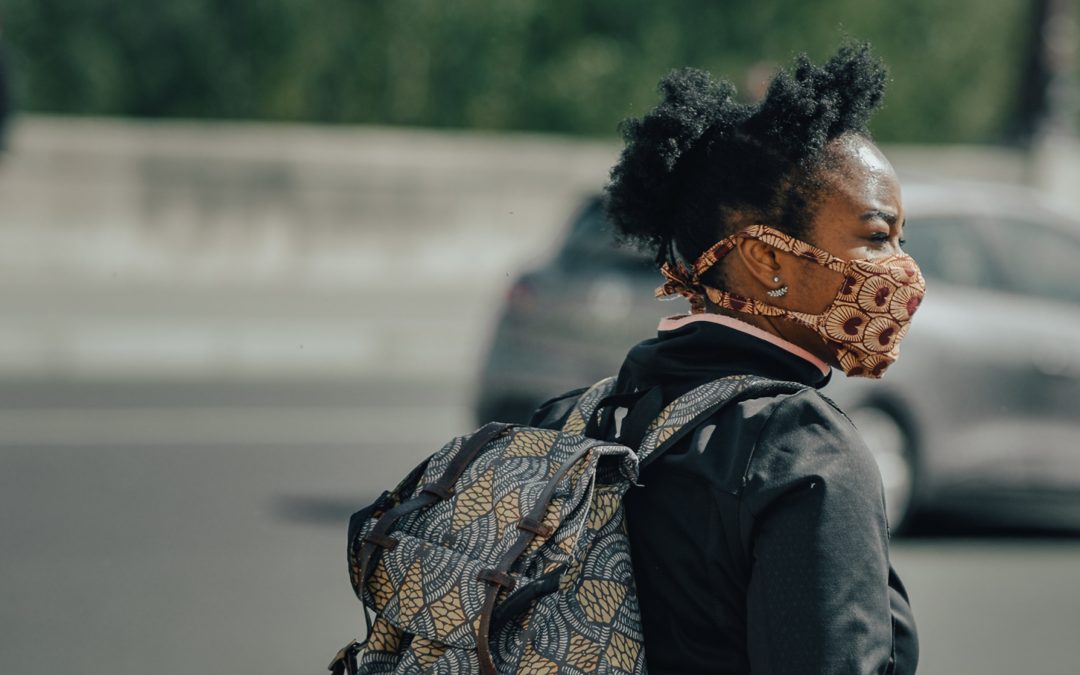Since its beginning, inequity has been a hallmark of the COVID-19 pandemic. Many of these are well-known—the particular risks posed by the novel coronavirus to adults older than 65 or who have pre-existing health conditions were identified early, and layoffs and furloughs caused by lockdowns disproportionately affected people working in service jobs. Others, just as dangerous to life and livelihood, lurk beneath the surface and have their roots in many of the broader, systemic crises facing American society at large, particularly with regard to race. A new report led by U-M School of Public Health Ph.D. student Delvon Mattingly is shedding new light on these hidden inequities.
Mattingly’s research has long focused on racial and ethnic health disparities. As an epidemiology master’s student at the University of Louisville, he worked with the American Heart Association Tobacco Center for Regulatory Science (TCORS), part of a collection of research centers at institutions and universities around the country funded by the Food and Drug Administration (FDA) and the National Institutes of Health (NIH) to inform their regulation of tobacco products. There, he learned about the significant health disparities faced by Black tobacco users compared to their white counterparts, despite starting to smoke at a later age and smoking fewer cigarettes per day on average.
In 2018, Mattingly arrived at U-M to continue his studies as a doctoral student under Department of Epidemiology Associate Professor Nancy Fleischer and learned that, thanks to a second round of NIH/FDA funding, a new TCORS center had been set up at U-M. As a result, he has been able to almost seamlessly continue his work on the social and structural determinants that drive health disparities in substance abuse, and tobacco product use specifically.
“Between the School of Public Health and having TCORS here, it’s been a really great fit for my research,” Mattingly says. “I’ve always had an interest in promoting health equity, and the work I do under the umbrella of TCORS will help inform the ways the FDA uses its regulatory powers.”

Many of the methods Mattingly uses to study disparities in substance abuse are valuable for understanding how COVID-19 impacts different groups of people.
The Shadow Pandemic
As the COVID-19 pandemic spread across the country, the importance of understanding the many ways it was impacting the health, families, and finances of those who contracted the disease became increasingly apparent. To that end, U-M Public Health partnered with the Michigan Department of Health and Human Services (MDHHS) to launch the Michigan COVID-19 Recovery Surveillance Study (MI CReSS). Led by Fleischer, MI CReSS aimed to document and analyze the experiences of adult Michiganders with confirmed COVID-19 cases in order to inform future responses to the pandemic in the state.
Through either an online questionnaire or conversation with trained interviewers, the MI CReSS team surveyed a demographically representative sample of 2000 Michiganders between June and September 2020, featuring questions ranging from the severity of their symptoms or the presence of preexisting conditions to participants’ experiences with physicians and the healthcare system.
The project yielded two reports. The first, released in October 2020, focused on the severity of respondents’ COVID-19 symptoms, their recovery time, and the impact the disease had on their mental health and employment. At the time the survey was completed, over 26 percent of the respondents had not fully recovered, and among those who had the recovery varied widely, ranging from one to 18 weeks.
Upon completion of the first report, Fleischer and her colleagues decided the best way to continue their work and help inform the state’s COVID-19 response would be to conduct a close analysis of the disease’s impacts across demographic lines. Given his longstanding expertise in health inequities, Mattingly was the natural choice to lead the new effort.
“The first report showed the extensive health, economic, and mental health ramifications COVID-19 had on Michiganders who were diagnosed with the disease,” Mattingly says. “As a follow-up to that, we wanted to investigate whether, and how, COVID-19 outcomes were different for white and Black respondents.”
Released in January 2021, the second report showed Black COVID-19 respondents had a more severe experience with the disease than white respondents, with nearly 73 percent of Black respondents reporting severe symptoms compared with just over 61 percent of white respondents, and 45 percent of Black respondents requiring a hospital stay compared to just 28 percent of white respondents.
Mattingly’s analysis revealed further disparities in how the two demographic groups experienced access to healthcare. Approximately one in 10 Black respondents reported negative experiences during COVID-19 testing and treatment because of their race, versus one in 50 among white respondents. Black respondents also reported greater stress from COVID-19 in terms of struggling to pay bills or being afraid to disclose a positive test result than white respondents.
“We know that racial health inequities in the United States persisted long before the COVID-19 pandemic,” Mattingly says. “These inequities are now becoming more evident as the disease disproportionately affects minority groups. Our findings show Black Michiganders are an at-risk group for this disease, including the detriments that follow a diagnosis, and that should inform our public health response.”
Prior to publishing the report, the MI CReSS team turned it in to MDHHS, where it is currently being used to help guide the department’s pandemic response.
“It’s important to consider how diseases like COVID-19 vary across different groups of people,” Mattingly says. “The goal is to highlight inequities in order to inform public health decision-making that produces long-term changes and improvements such as dismantling barriers to healthcare and addressing the problem at its core.”
How Rackham Helps
Mattingly is a recipient of the Rackham Merit Fellowship, fully funding three years of his doctoral program. In 2019, he received a Rackham Professional Development Grant, as well as a Rackham Conference Travel Grant, which allowed him to attend the NIH Tobacco Regulatory Science Meeting in Bethesda, Maryland.

